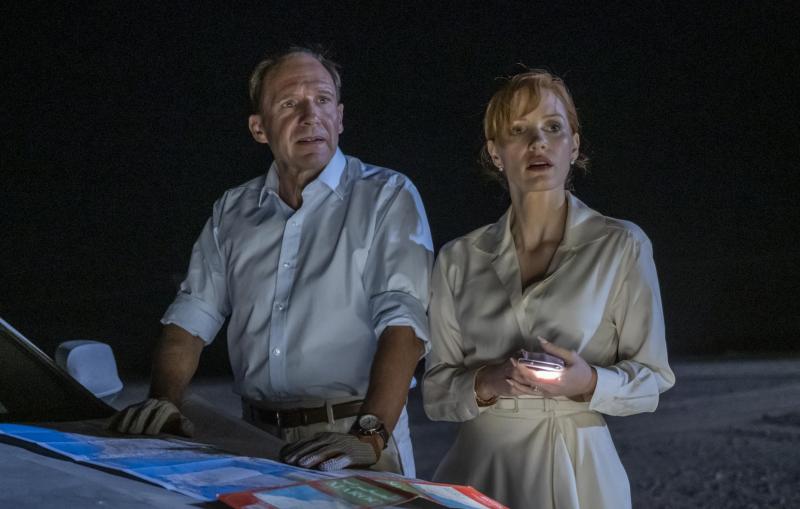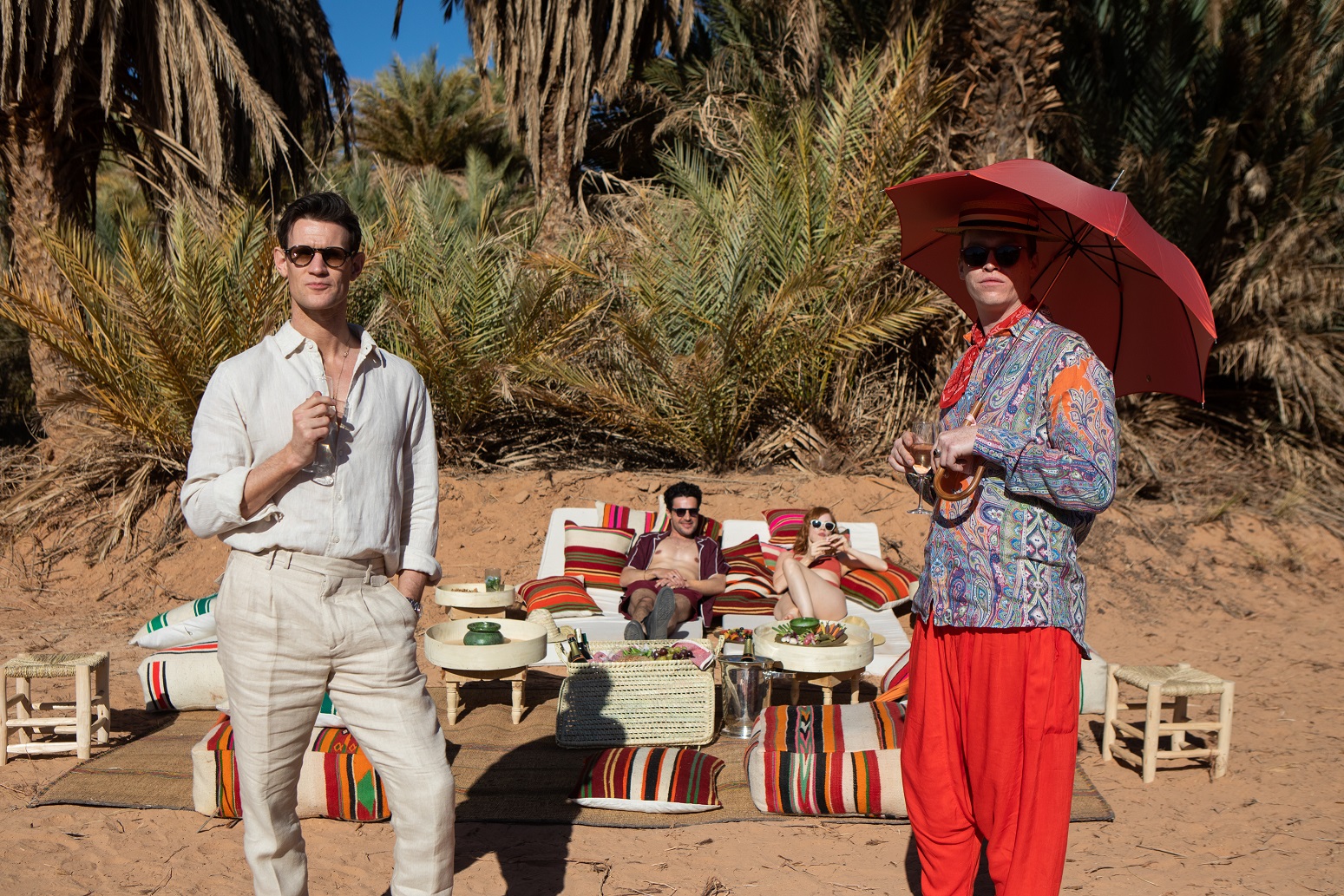The Forgiven review - the shelterless sky | reviews, news & interviews
The Forgiven review - the shelterless sky
The Forgiven review - the shelterless sky
Ralph Fiennes and Jessica Chastain seek salvation after a desert hit and run

John Michael McDonagh’s acerbic tragedy of manners and morals sees West meets East, in a literal car crash of sloppy behaviour and messy intentions.
Alcoholic doctor David and blocked children’s author Jo (Ralph Fiennes and Jessica Chastain) are the burnt-out upper-class couple speeding through the Moroccan night, David drunkenly at the wheel, when Berber boy Driss (Omar Ghazaoui) steps into their path. They fatally hit, and run on to the decadent party at the desert home of Richard (Matt Smith). It seems a clean getaway, till Driss’s father Abdellah (Ismael Kanater) arrives at the gates, demanding retribution.
David is a bored, boorish provocateur, an articulate piss artist with a snapping sneer. Jo is emptied by the effort of attending him. They’re in good company at the party, where a liberal French photographer, leering English aristo and crass Aussie party girl are all pretty vacant, and mutably charming American Tom (Christopher Abbott) catches Jo’s eye. When Richard’s oafish partner Dally (Caleb Landry Jones, pictured below with Smith) starts joking about vaginas in a grating slur, it seems just too much, like Brett Easton Ellis scripting a Buñuel soiree. Yet when Abdellah insists that David travel to his village to atone for his son’s death, something in his words, and the sight of Driss’s corpse, sends David back into the desert. A slumbering moral nerve has been touched, finding atavistic residues of duty and guilt. The further David goes, the more his cynically crusted pores are purged, as he blurrily seeks redemption.
Yet when Abdellah insists that David travel to his village to atone for his son’s death, something in his words, and the sight of Driss’s corpse, sends David back into the desert. A slumbering moral nerve has been touched, finding atavistic residues of duty and guilt. The further David goes, the more his cynically crusted pores are purged, as he blurrily seeks redemption.
Meanwhile, back at the party, Jo seems contrastingly selfish, concern for her endangered husband fading. Chastain doesn’t pretty this up, instead honestly tracing Jo’s indulgence in blissful sex and creative awakening, now she’s out from David’s contemptuous thumb.
McDonagh’s adaptation of Lawrence Osborne’s novel has unmistakable echoes of Paul Bowles’ The Sheltering Sky, about the fatal unravelling of a privileged American couple crossing the post-war Sahara. Port and Kit (John Malkovich and Debra Winger in Bertolucci’s film) are repugnantly racist and poisoned by drink as they slip into a vortex of self-destruction. A current writer would shiver at such protagonists, but they’re truthfully colonial, and their descents grip with tragic force. Those realities haven’t changed, only our comfort in seeing them. McDonagh is unfashionably fond of such bracing characters, though far more satirical (as in his Brendan Gleeson hit The Guard), much like brother Martin (Three Billboards Outside Ebbing, Missouri). McDonagh’s Moroccan characters are sometimes effortfully saved from cliché. Richard’s major domo Hamid (Mourad Zaoui, pictured above second right with Kanater, right) laughs gently when his stream of proverbs is broken by a friend suggesting he should be on Twitter. Martyred Driss, an oddly nocturnal fossil-seller according to the narrative everyone acts on, in fact planned a gunpoint robbery. Abdellah sheds his Berber warrior façade to reveal an urbane English conversationalist as he parlays with David for his life and soul: the price that must be paid.
McDonagh’s Moroccan characters are sometimes effortfully saved from cliché. Richard’s major domo Hamid (Mourad Zaoui, pictured above second right with Kanater, right) laughs gently when his stream of proverbs is broken by a friend suggesting he should be on Twitter. Martyred Driss, an oddly nocturnal fossil-seller according to the narrative everyone acts on, in fact planned a gunpoint robbery. Abdellah sheds his Berber warrior façade to reveal an urbane English conversationalist as he parlays with David for his life and soul: the price that must be paid.
Abdellah’s driver Anouar (La Haine’s Saïd Taghmaoui), dreaming in his desert cauldron of the chilly Sweden seen in magazines, befriends David, but is finally confounded by him. His nomad culture is dying as surely as Driss, symbolically reliant on finding fossils for Westerners. Cinematographer Larry Smith films this country – blinding azure buildings, the hard scrabble of desert rock, pink flamingos in a verdant oasis – with crisp digital realism.
The Orientalist charge that sticks isn’t for the obnoxious pricks in Richard’s enclave – a post-colonial redoubt thinly protected by money and his slippery charm – but the fact that this is finally David’s story, with the Berbers the proving stone for his possible salvation.
Fiennes has been this way before. There are echoes of his record producer’s dying fall in A Bigger Splash, and he was once TE Lawrence. Even as Bond’s M, he mines his own class’s mostly buried belief in honour. Where Anthony Hopkins specialises in repression as aching silence, Fiennes secretes pain beneath bombast and rage. His David is what you take out of the desert.
The future of Arts Journalism
You can stop theartsdesk.com closing!
We urgently need financing to survive. Our fundraising drive has thus far raised £49,000 but we need to reach £100,000 or we will be forced to close. Please contribute here: https://gofund.me/c3f6033d
And if you can forward this information to anyone who might assist, we’d be grateful.

Subscribe to theartsdesk.com
Thank you for continuing to read our work on theartsdesk.com. For unlimited access to every article in its entirety, including our archive of more than 15,000 pieces, we're asking for £5 per month or £40 per year. We feel it's a very good deal, and hope you do too.
To take a subscription now simply click here.
And if you're looking for that extra gift for a friend or family member, why not treat them to a theartsdesk.com gift subscription?
more Film
 Bugonia review - Yorgos Lanthimos on aliens, bees and conspiracy theories
Emma Stone and Jesse Plemons excel in a marvellously deranged black comedy
Bugonia review - Yorgos Lanthimos on aliens, bees and conspiracy theories
Emma Stone and Jesse Plemons excel in a marvellously deranged black comedy
 theartsdesk Q&A: director Kelly Reichardt on 'The Mastermind' and reliving the 1970s
The independent filmmaker discusses her intimate heist movie
theartsdesk Q&A: director Kelly Reichardt on 'The Mastermind' and reliving the 1970s
The independent filmmaker discusses her intimate heist movie
 Blu-ray: Wendy and Lucy
Down-and-out in rural Oregon: Kelly Reichardt's third feature packs a huge punch
Blu-ray: Wendy and Lucy
Down-and-out in rural Oregon: Kelly Reichardt's third feature packs a huge punch
 The Mastermind review - another slim but nourishing slice of Americana from Kelly Reichardt
Josh O'Connor is perfect casting as a cocky middle-class American adrift in the 1970s
The Mastermind review - another slim but nourishing slice of Americana from Kelly Reichardt
Josh O'Connor is perfect casting as a cocky middle-class American adrift in the 1970s
 Springsteen: Deliver Me From Nowhere review - the story of the Boss who isn't boss of his own head
A brooding trip on the Bruce Springsteen highway of hard knocks
Springsteen: Deliver Me From Nowhere review - the story of the Boss who isn't boss of his own head
A brooding trip on the Bruce Springsteen highway of hard knocks
 The Perfect Neighbor, Netflix review - Florida found-footage documentary is a harrowing watch
Sundance winner chronicles a death that should have been prevented
The Perfect Neighbor, Netflix review - Florida found-footage documentary is a harrowing watch
Sundance winner chronicles a death that should have been prevented
 Blu-ray: Le Quai des Brumes
Love twinkles in the gloom of Marcel Carné’s fogbound French poetic realist classic
Blu-ray: Le Quai des Brumes
Love twinkles in the gloom of Marcel Carné’s fogbound French poetic realist classic
 Frankenstein review - the Prometheus of the charnel house
Guillermo del Toro is fitfully inspired, but often lost in long-held ambitions
Frankenstein review - the Prometheus of the charnel house
Guillermo del Toro is fitfully inspired, but often lost in long-held ambitions
 London Film Festival 2025 - a Korean masterclass in black comedy and a Camus classic effectively realised
New films from Park Chan-wook, Gianfranco Rosi, François Ozon, Ildikó Enyedi and more
London Film Festival 2025 - a Korean masterclass in black comedy and a Camus classic effectively realised
New films from Park Chan-wook, Gianfranco Rosi, François Ozon, Ildikó Enyedi and more
 After the Hunt review - muddled #MeToo provocation
Julia Roberts excels despite misfiring drama
After the Hunt review - muddled #MeToo provocation
Julia Roberts excels despite misfiring drama
 London Film Festival 2025 - Bradley Cooper channels John Bishop, the Boss goes to Nebraska, and a French pandemic
... not to mention Kristen Stewart's directing debut and a punchy prison drama
London Film Festival 2025 - Bradley Cooper channels John Bishop, the Boss goes to Nebraska, and a French pandemic
... not to mention Kristen Stewart's directing debut and a punchy prison drama
 Ballad of a Small Player review - Colin Farrell's all in as a gambler down on his luck
Conclave director Edward Berger swaps the Vatican for Asia's sin city
Ballad of a Small Player review - Colin Farrell's all in as a gambler down on his luck
Conclave director Edward Berger swaps the Vatican for Asia's sin city

Add comment